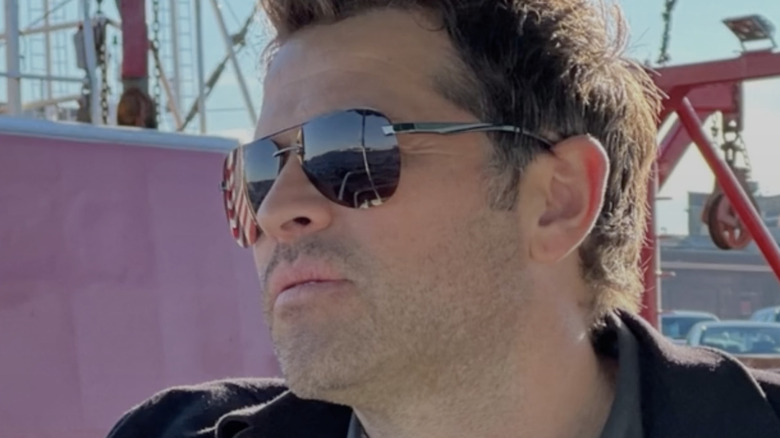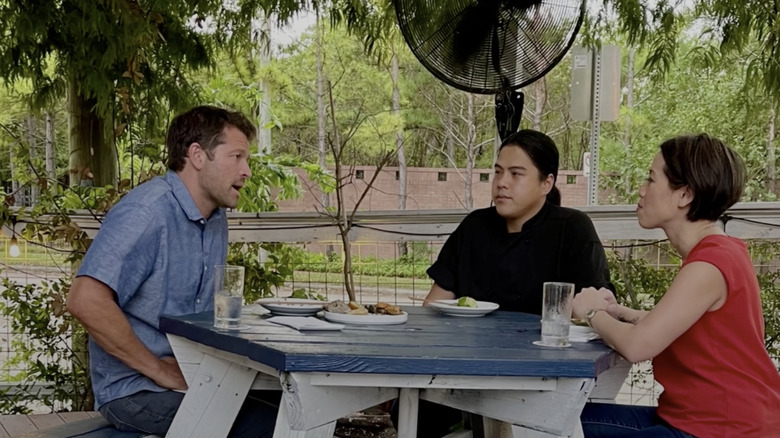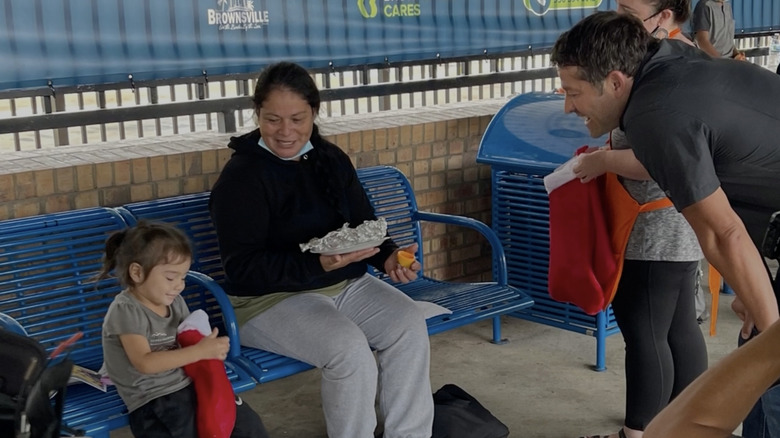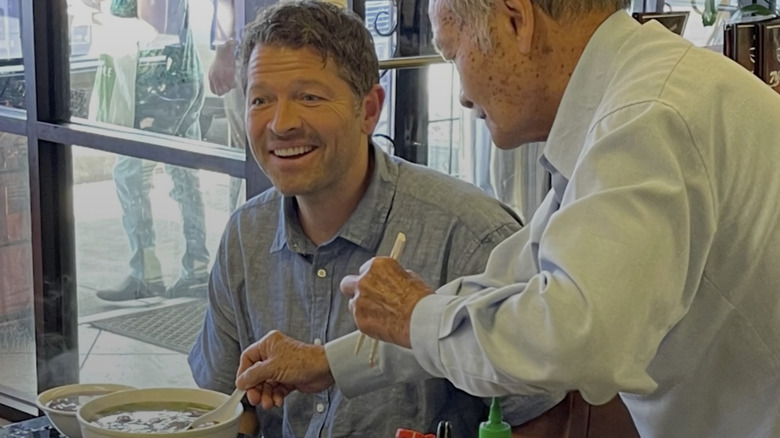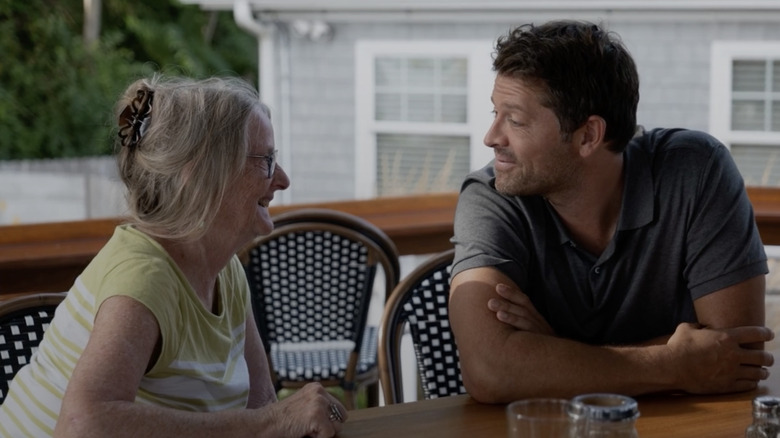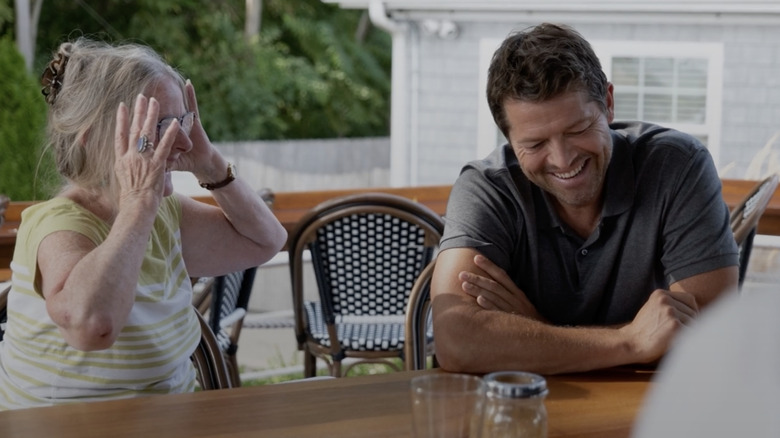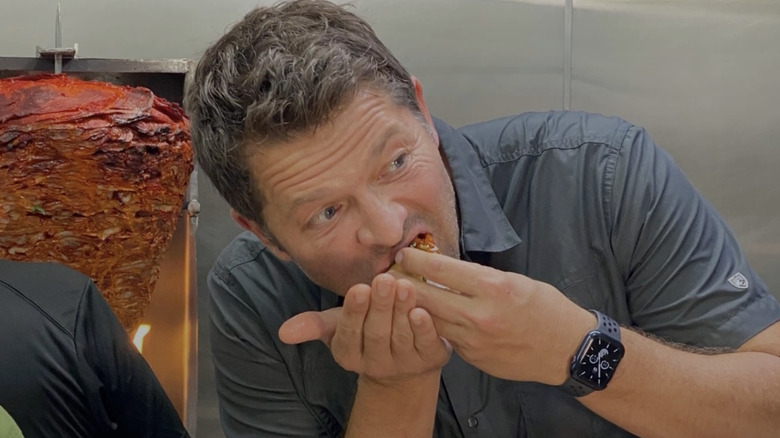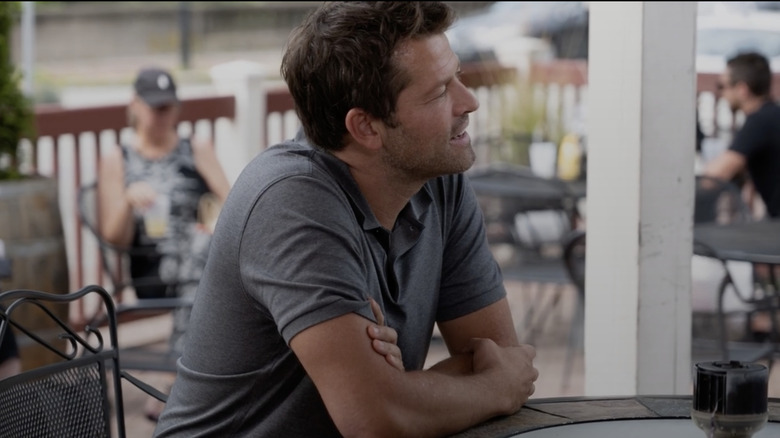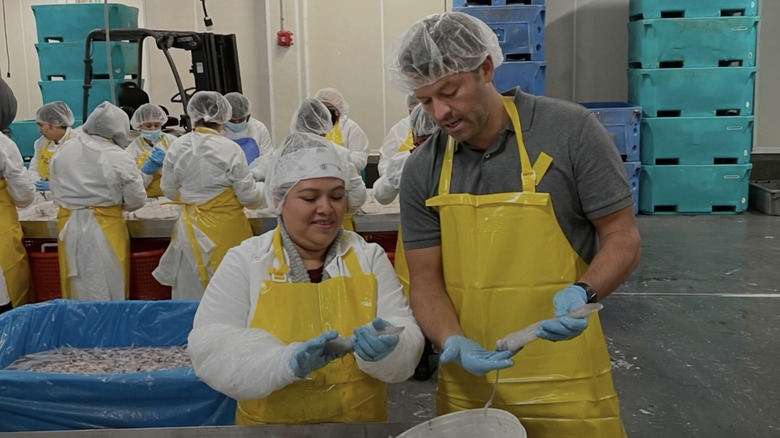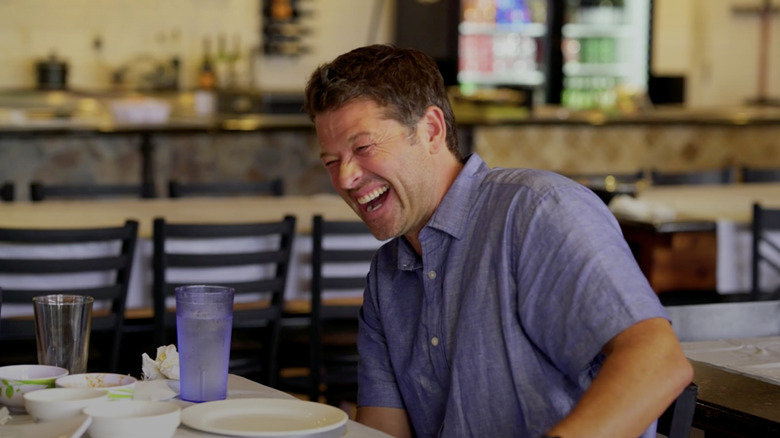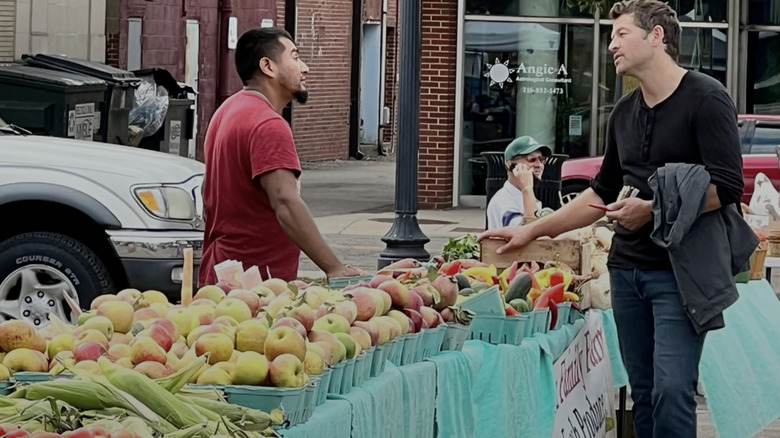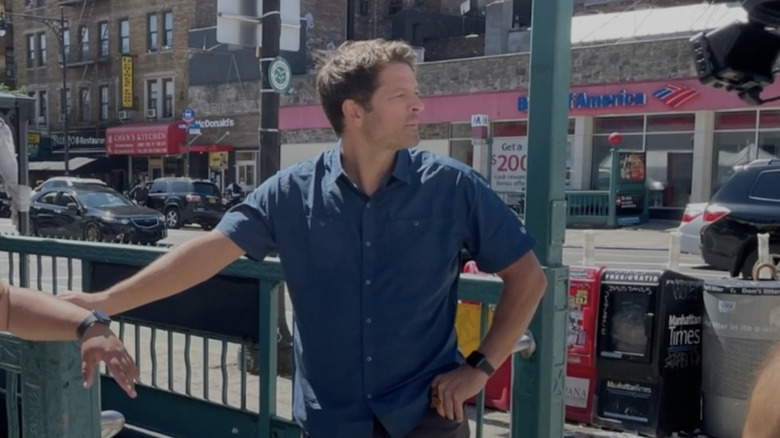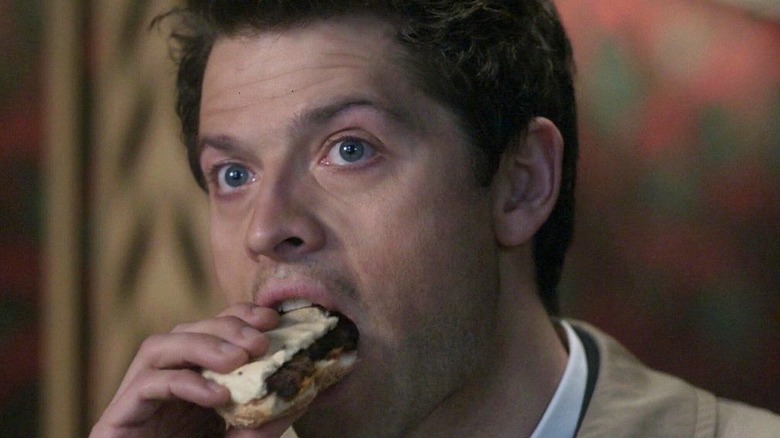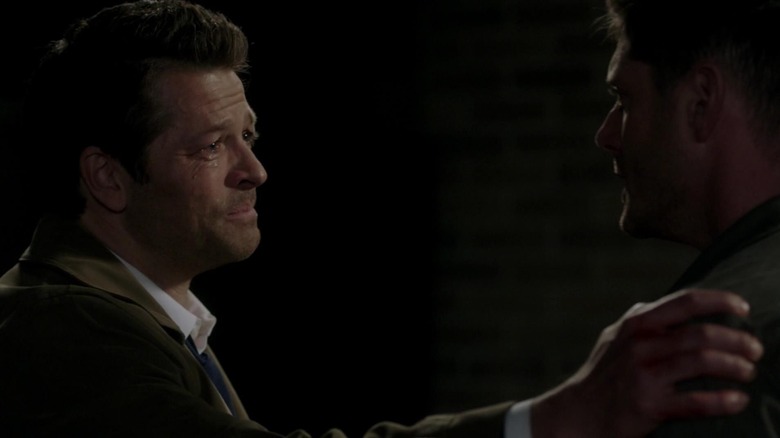What Misha Collins Learned On Roadfood, Eating On Supernatural, And GISH - Exclusive Interview
Misha Collins went from hitting the road in a '67 Chevy Impala with the Winchester bros on "Supernatural" to cruising the U.S. on his new show "Roadfood." However, instead of hunting down ghosts and demons as the angel Castiel, Collins is searching for the best culinary gems America has to offer — all while boasting some classic rock hits that would surely make Dean proud.
This isn't the actor's first foray into food. Almost a decade ago, Collins started a series of YouTube cooking videos with his son called "Cooking Fast and Fresh with West," where he gave him full autonomy over ingredients, the off-the-cuff recipes, and the final product. Pasta with jam sauce may not be as palatable as some of Collins' "Roadfood" finds, but getting kids involved with decision-making in the kitchen is a great way to get them to care about cooking. Years later, in 2019, Collins expanded on that concept, co-writing the cookbook "The Adventurous Eaters Club: Mastering the Art of Family Mealtime" with Vicki Collins. Don't worry — the recipes are a little more sophisticated than West Collins' mildly horrifying pasta with jam sauce creation (though tomato upside-down cake might have it beat).
When Collins isn't in the kitchen, he's busy building up his vast catalog of acting credits in projects like the 1999 film "Girl, Interrupted," and stints on TV shows like "Charmed," "24," and "Timeless." He also recently teamed up with "Lore" podcast creator Aaron Mahnke for the podcast series "Bridgewater" alongside actors like Melissa Ponzio ("Teen Wolf"), Nathan Fillion ("Firefly"), and Karan Soni ("Deadpool"). In 2021, Collins went back to his poetry roots to publish a book of poems titled, "Some Things I Still Can't Tell You." To top it all off, Collins is a vocal activist, helping cultivate a more empathetic world through his charity Random Acts and his kindness-filled and record-breaking annual international scavenger hunt, GISH.
During an exclusive interview with Mashed, Collins revealed his inspiration for "Roadfood," hanging out with his mom during an episode, food insecurity and other social issues the series tackles, and the food he's not keen to try again. He also explained how that elusive McDonald's GISH item came about and why kale went from the scavenger hunt's top billing to public enemy number one. The "Supernatural" alum even went down memory lane on filming that epic Castiel burger scene and got candid about his character's swan song.
Discovering America's hidden culinary gems
I love how you focus on aspects of a city's food and culture that might not be the first thing that people think of when they hear a city's name, but are integral to its history. How did you decide on the city's food and culture to hone in on during episodes, and what does that research process look like?
Part of it was the arc of the season. We wanted to make sure that we were getting a disparate representation of different things and different places around the country. We wanted a mix of urban and rural "ethnic and non-ethnic" — although those terms are very troublesome — politically conservative, politically liberal, and also geographically dispersed. You said not necessarily the first thing that you think of when you think of that city or place, and that is important to us. We don't want to do the obvious thing. We don't want to do what a typical food show would do, but that's also because you find more interesting things when you're exploring the off-the-beaten-path, and "Roadfood" is very much about off-the-beaten-path.
The show is based on these books by Jane and Michael Stern, called "The Roadfood Guides." One of their edicts was, "Stay off of the main interstate highways, because when you get off of an interstate highway off-ramp, you're going to see the same thing almost anywhere in the country — it's all homogenized, it's all box stores, and it's all fast-food chains. It's Taco Bell, and it's Walmart, and it's everything of that ilk. If you venture ten miles away from an interstate, you all of a sudden start finding unique flavors of the country.
We wanted to venture a little bit off-the-beaten-path, both literally and figuratively in this show, and also find people who aren't used to talking to reporters [and] television crews, because that also provides a glimpse into people's psyche and aspects of the country that are more authentic, in my opinion.
U.S. diversity on and off the plate
In addition to diving deep into various cultures with food, you also tackle critical social issues that many of these communities face — like Black Lives Matter and offering kids better mental health services and healthcare. What has been most rewarding about those kinds of conversations?
I don't want to sound too pedantic or prescriptive here, but I wanted to do this show to have those conversations — and I love food. I wrote a cookbook. I care about food. Food is my love language. I cook for my kids every day, but what was most exciting for me about this show was using food as windows into worlds and having the opportunity to sit down, break bread with people, literally and also figuratively, and be able to have these conversations that I wouldn't otherwise be privy to, and meet people that I wouldn't otherwise meet. One of the things that I took away ... You're asking what was most rewarding to me. I had a very trite theory going into this enterprise, which was that I was going to discover that we're all the same.
We draw these big lines in the sand, between the red states and the blue states and the Trump supporters and the Biden supporters and the north and the south and the Christians and the Agnostics — and ultimately, we're all the same. That was my premise. What I discovered along the way was, I actually think that we're radically different from one another.
It shouldn't be the epiphany that it was, but I ended up walking away from this experience realizing, "Holy s***, Americans are really..." That is an incredibly diverse category of people with totally different frameworks that they're living from, totally different life experiences, and totally different value systems. The idea that somehow we're going to find this homogenous thread that binds us all together is foolhardy and wrongheaded. It's actually more interesting that we're all different, and it's more interesting to explore a country that is all different.
Slicing through consumerist America
The thing about America that I don't like, to be honest, and I saw this on this trip, was the places where it is homogenized. The off-ramps, where it is all just Taco Bells and Walmarts and Pizza Huts — that is the part that I don't like. The sameness in America is actually this very corporate, very consumerist, and awful version of America. The diverse aspects of America, the places where we're different, are the places where America's actually interesting.
I loved talking to the mayor of Tangier Island in the Chesapeake Bay. There had been an election there a couple of days before we were there. It was the November election for, among other things, governor of Virginia, and there were [substantially more votes for the Republican candidate than anyone else]. It was like, it's completely home-supporting and Red.
In fact, Donald Trump had called the mayor because this particular little poster stamp of an island is so completely [die-hard] Trump supporters. That was fascinating for me because, in my circles, I am an outspoken progressive. In my circles, I don't have a lot of conversations with people who are die-hard Trump supporters. That was fascinating to me, to be able to spend the day talking about politics with people who I don't cross paths with in my world. That was really illuminating.
The grossest cake in existence (probably)
You got to bring your mom along for the journey in the Rhode Island episode. What was that experience like, and what were some of the staple comfort dishes from your childhood that you used to eat with her?
Well, my mom was in ... That was actually the first episode that we shot, in Rhode Island. That scene that was shot with my mother in that episode was the last scene that we shot in the first episode. I was on a tight schedule, and I'm a bad son. Instead of building in an extra day to my travel and going to visit my mother, I told her to come drive down from Massachusetts to visit me on set. It was an hour before she got there that it occurred to me: Maybe we should record her. That might be weird. She wasn't expecting it. It was an ambush. She thought that she was going to sit on the side of the set while I interviewed somebody else, but I ended up putting her on camera, and it was funny. [Laughs]
My mom brought my favorite ... It had recently been my birthday at that point. I hadn't seen my mother on my birthday, so she surprised me with a birthday cake. When I was a kid, I used to always ask for pineapple upside-down cake because that was my favorite. It still is, actually. If I was going to pick a birthday cake right now, I'd say I would like a pineapple upside-down cake, and a flood of childhood memories comes back.
She had done a twist on the pineapple upside-down cake and brought a surprise for me, which was a tomato upside-down cake, that was not cooked all the way. It was like this runny, [batter-filled], tomato upside-down cake. [That] cake made it into the episode. None of this was planned or staged in any way. My mom actually brought me a birthday cake that she thought I would like, and it was also not hyperbolic. All of this is in the episode.
We weren't exaggerating, but it was f****** disgusting. It was hands down the worst cake I've ever had. [Laughs] On the surface, it sounds bad, but there's a part of me that thinks, "Tomato upside-down cake ... maybe that's actually good. Who knows? Let's try it." I can vouch for it not being good. It was not tasty — especially not being cooked, but it was fun having my mom on there. That also set the stage for an extemporaneous spirit for the rest of the season where we're ... We followed leads a lot of the time, and if someone seemed interesting or let us down a path that seemed interesting, we could follow that.
The comfort foods of years past
We had a really tiny crew, which was cool because we were so nimble. We could literally jump ... There were a couple of times when I was like, "Well, do you mind if we jump in the car with you?" to whomever the person that was interviewing us was, and we would go for a drive that was unplanned and throw a couple of cameras in the back, and it worked. It was nice having my mom on and talking to her a little bit.
Oh, the rest of your question was comfort foods from childhood. ... Pineapple upside-down cake is a comfort food for me. Lasagna was something that my mom made a lot. I think that the foods that my mother made often were foods that ended up being comfort foods. She made a lot of quiches.
We lived without refrigeration for long chapters of my childhood. We were sometimes homeless and living in the woods with a big tub in ... Didn't even have a cooler. We had a big open galvanized metal bucket that we would get ice in once a week, and the ice would be melted the next day, and all of the dairy products would rot. As soon as the dairy products started to get mold on them, she would throw them into a baking pan and make a quiche.
That was like ... [Laughs] When the dairy started to go bad, it was time for quiche. Quiche is a comfort food for me ... I like onion pie ... I'm sure I can think of lots of other comfort foods, but that's what's coming to mind at the moment.
The cardinal Roadfood rule: No stunt eating
What was the most unpredictable dish that you encountered in "Roadfood"?
I don't know how you define surprising. I don't know that I'd ever had crawfish before, and we had the Viet-Cajun Crawfish, which were surprisingly delicious to me. That was a surprise in a good way. Barbacoa is something that I had heard of — and it's basically roasted cow's head, somewhere between a slow roast and a barbecue, I guess. I had seen Barbacoa on menus, but I didn't know that all of the meat surrounding the head was consumed: the tongue, the cheeks, the jowls, and most notably the eyes.
Having an eye taco was something that I ... One of the things that we talked about when we were conceiving of the show was, we don't want to do "stunt journalism eating" on this. We're not seeking out the weirdest, or the grossest of exotic foods like Anthony Bourdain did in his early work. We're not going to go get the venom out of snakes and make it into a drink or whatever. We did Barbacoa without the intention of making it a sensationalized, disgusting display.
Nonetheless, when push came to shove, and an eyeball was proffered to me on a taco, I felt compelled to try it. I'm sure that if I had eaten that and been told that it was some succulent part of the haunches of a cow or something, I would've been fine, but it was conceptually difficult to eat an eye, and the texture was quite eye-ish. That was surprising. I am cringing just a little bit right now.
It's not something I'm eager to go back for. The thing that was surprising to me too, is that on the door of this place ... This is a place where they serve Barbacoa. It's a restaurant in Brownsville, Texas. They have a sign on the door that says ... in Spanish, "We don't have eyes." That's because the eyes are the first thing to go. Every time they take a head out of the fire pit, everyone lines up to get the eyes. They have a shortlist of VIP regular customers that already have dibs on all the eyes, so don't bother showing up to [their] place, asking for eyes, because they're already gone.
The food insecurity epidemic
Your charity, Random Acts, has done incredible work in the past few years to tackle food insecurity, and "Roadfood" touches on this as well. Why is this such an important issue to you, and how do you think that we can be less wasteful and do our part to help combat this issue?
Food insecurity is a huge issue. I hate to say it, but we're actually in a seat of privilege in this country, in the United States, where food insecurity is significantly less of a problem than it is in some places in the world, where food insecurity actually results in famine and death. In our country, food insecurity tends to lead to obesity and diabetes because food insecurity is often related to a lack of access to healthy, affordable food. People end up eating unhealthy foods that precipitate health problems. Food insecurity also ... I remember, I came from a ... My experience as a child was such that we had to think about where we were getting our food. We went to soup kitchens, and ... I got free food from my public elementary school. I got breakfast and lunch served at school.
Those were foundational cornerstones for my family. If we didn't have access to ... I'm not going to be able to do my schoolwork if I'm actually hungry, and we needed that boost. It's so unbelievably, in the scheme of things, affordable to feed people, that's one of the cheapest things we can do. It's so critical and foundational, and the fact that in the United States, there are families that are unsheltered and not properly fed is a tragic miscarriage of justice because we could reallocate just a tiny fraction of the money that we spend on unnecessary wars and more than solve those problems.
Paving the Roadfood path forward
Speaking from the activist vantage point, one of the issues that I want to be more thoughtful about in any subsequent seasons of "Roadfood" is, I want to showcase healthier food than we did in its first season ... That really wasn't a primary filter that we applied until we got later in the season and realized, geez, part of the problem here is we identified foods that we wanted to... We identified regions, and we identified local cuisines that were important to the people in those regions. By default, when you do that, you end up getting a lot out of unhealthy food because Americans, unfortunately, have a really s***** diet. Americans eat unhealthy food, and it's why our country has such a preponderance of diabetes and obesity and other health-related issues that are a direct result of the food that we eat.
I want to be thoughtful about not creating a marketing platform for unhealthy food. If I'm going to be continuing to do a food show, I want it to be something that is also helping to move the needle toward a different paradigm of healthier and, frankly, more environmentally friendly food because these are big issues.
Consuming animal products is a very, very significant contributing factor to climate change. It's possibly as much ... Our poor farming habits that are related to the meat and dairy industry are possibly responsible for as much as a third of greenhouse gases. That's huge, and it's not something that gets talked about a lot. We talk about electric cars, and we talk about jet airplanes, but we don't spend a lot of time talking about the fact that bacon is bad for the climate. I am thinking about these things, but not necessarily all of the details got folded into our first season of "Roadfood."
Collins' long-lost McDonald's commercial
You have a significant number of food-related items in your annual Scavenger Hunt, GISH. How did the items like the recent McDonald's commercial deep dive come about, and how did kale go from being the go-to GISH ingredient to a redacted ban?
I did a McDonald's commercial. It was one of the ... I'm trying to think. It may have been the job, now that I mention it. This is the first time this is dawning on me. I think this McDonald's commercial was when I got my Screen Actor's Guild union membership. It was the very, very ... One of the very first things I shot, and I was a very young actor living in Washington, DC. I got this regional McDonald's commercial that was only to be aired in Maryland and maybe Northern Virginia. It only featured ... my socked feet. You couldn't see my face at all, and you couldn't hear my voice. Somehow, it's one of the few things that I ever filmed that I have never seen the footage of.
I made it an item in my scavenger hunt to track down the McDonald's commercial, which a lot of people put a lot of effort into, and no one found it. Somewhere, I'm ... Well, who knows, maybe it's not out there, but I think it's probably out there somewhere. I'm stunned by the things, like [material] for the Navy and how-to videos that I recorded for the IRS and things like that, that people have found. The IRS videos where somebody found in a library, sale bin, at a public library — they were selling this old VHS tape for 10 cents, and somebody picked it up and saw me on the front.
The GISH fall of kale
Kale, at the beginning of GISH, my scavenger hunt, I had a lot of items there ... For those who don't know, GISH is like... It's the largest scavenger hunt in the world. People participate in over 100 countries. We've broken a bunch of Guinness world records with it. It's a lot of fun. People occasionally get arrested. [Laughs] Kale was featured prominently in the first few years. It was like, there's always that item with kale. Kale this, kale that. I happened to be a kale enthusiast.
At one point, I had said something flattering about kale, and somebody contacted me from the national association of kale growers and made me the official spokesperson. I was like, "That's amazing. What's that going to entail? Like, what kind of money am I getting here?" They were like, "No money, but we're going to send you some t-shirts." I was like, "That's awesome." They sent me these three t-shirts that were extra small women's. It looked like a tube top up on me. It was ridiculous.
There's an actual bona fide reason that I stopped having kale be a part of GISH. I don't like it when subcultures start having their own self-referential themes. I used to go to Burning Man, which is this amazing party in the desert in Nevada, and 80,000 people attend. It started with a very simple premise of no rules ... It's a party, it's a celebration of art. There's no economy, which is really cool. You're not allowed to exchange money, ... it's not even a barter economy. You're allowed to give things away, but nobody's coming there to make money, and people can just do whatever they want.
Burning for kale — then banning it
When Burning Man started, people were walking around with machine guns and flame throwers and literally firing off machine guns and flame throwers, and there were no ... It's on Bureau of Land Management land. There were no restrictions of whether you could be naked or not naked or whatever. It was this wide-open cultural experiment with no formalized economy and no infrastructure, and yet, somehow, people still figured out how to make it work. The cool thing about it was, it was like starting over. There are no cultural constructs that you have to subscribe to here at Burning Man.
After a few years, everybody started to dress up like Burners, and Burner became an identity. There were all of these words, terms, and styles that evolved at a Burning Man that were identifiable as "from Burning Man." If I walk down the street in San Francisco, I can pick a Burner out of a crowd because of the way they dress in this sort of moon shop. It's like a mashup of "Mad Max" meets steampunk, meets hippie, and you can identify the Burner from a distance. I am interested in cultural experiments that don't result in their own insular cultural vocabularies. [Laughs] That's why I jettisoned kale, and that's a really long-winded answer to that question, I'm sorry.
Castiel's burger bonanza
Food was a massive part of "Supernatural" as well, particularly for Dean. In the episode "My Bloody Valentine," Cas develops a serious hankering for burgers. What was that scene like to shoot, and how many burgers did you actually eat? Because in some of the bloopers, it seems like the actors actually ate the food, but was there an option for a spit bucket, and what was the weirdest food substitute from that show that you had to drink or eat?
I hadn't done a lot of eating on "Supernatural" up until that point. For those who are reading this and who don't know, this was an episode in which Famine — the embodied character of Famine — casts a spell on me, and he makes me voraciously hungry and insatiable. I keep eating and eating, and I'm eating, for some reason, burgers. I end up on all fours eating out of a dog dish at one point. I'm eating what appears to be raw ground beef, but in fact, it was vegetarian ground beef, also raw. That was pretty vile.
My character was an angel on the show, and angels in the supernatural universe don't need to eat. I didn't have a lot of experience on the show eating. For, I guess, pure coincidence, I hadn't done a ton of eating on camera in my career to that point. We started that episode, and I was eating these burgers in these scenes and starting to get really ... I was like, "I don't know how I'm going to make it through this episode because I don't feel good. I am stuffed to the gills." Jensen [Ackles], my castmate at one point, looked at me ... We were in the middle of a take, and I was already starting to feel not good. He said, "Dude, what are you doing? Did you just swallow that?" I was like, "Yeah?" And he said, "What, are you, new? What are you doing? You spit that out!" I was like, "Ooh, that makes so much sense." [Laughs] I learned an important lesson there.
How much did you end up eating before that revelation?
I don't know. I wasn't keeping a running tally, but it was not a small number of burgers.
Destiel shines through the despair
Your "Supernatural" character, Castiel, made TV history during the episode "Despair," where he confesses his love for Dean. You've hinted that some of that was your doing. If you're able to talk about it, what did some of those initial conversations look like? While it wasn't as blatant as some fans would've liked, how does it feel that you were able to bring this incredible representation to the character when no one thought it was possible?
Like much of the audience, somehow, I didn't think that such a, frankly, butch, heteronormative show on a broadcast network would have a character's ending be what my character's ending was. When Bob Berens, who was a producer on the show and the writer of the episode in which my character dies, proposed this ending where my character confesses his love for Dean, who's one of the two main characters, I was like, "Oh, we can do that? That's amazing."
The representation and openness that my character expressed at the end was symbolically meaningful to me. It made my time on the show feel more meaningful and valuable, so I'm very grateful for it. I'm glad that everyone let us do something that was ... It shouldn't be brave. It should be normal. [Laughs] The fact that we're having a conversation about it is indicative of the fact that we have a long way to go.
Fans can check out new "Roadfood" episodes streaming Saturdays on PBS Passport and the PBS Living Channel on Prime Video. The series also airs on PBS, so make sure to check your local listings for air times. To keep up-to-date on any future international release dates, check out the "Roadfood" website.
